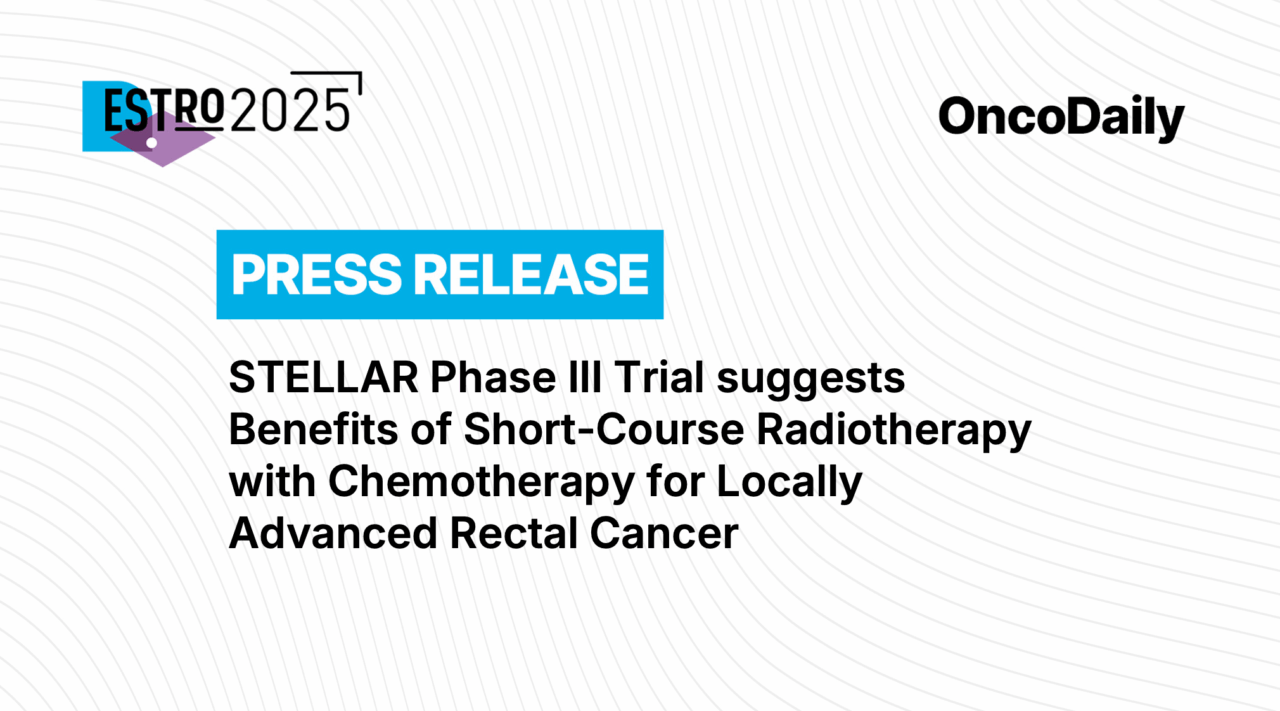
STELLAR Phase III Trial Suggests Benefits of Short-Course Radiotherapy with Chemotherapy for Locally Advanced Rectal Cancer
Vienna, Austria — A new phase III STELLAR clinical trial has shown that a shorter, more intensive preoperative treatment approach significantly improves long-term survival in patients with locally advanced rectal cancer (LARC). The findings, presented at ESTRO 2025, the annual congress of the European Society for Radiotherapy and Oncology, suggest that short-course radiotherapy followed by chemotherapy and surgery may offer better outcomes than the current standard of long-course chemoradiotherapy.
Shorter Treatment, Greater Survival
Rectal cancer patients typically receive either long-course chemoradiotherapy or short-course radiotherapy followed by surgery. In the STELLAR trial, researchers evaluated a new protocol combining short-course radiotherapy with chemotherapy before surgery to see whether it could offer equal or better outcomes.
The study enrolled 591 patients with LARC, randomly assigned to receive one of two preoperative treatments:
-
Standard treatment: Long-course chemoradiotherapy before surgery
-
New approach: Short-course radiotherapy followed by chemotherapy before surgery
After five years, patients who received the new, shorter treatment approach had a survival rate 8.4% higher than those on the standard regimen. Notably, quality of life and anorectal function were similar between both groups, indicating that the shorter treatment did not compromise post-treatment well-being.
A Game-Changer for Patients
“The results indicate that the shorter radiotherapy approach is comparable in effectiveness to the standard treatment and may also be associated with improved survival. This approach could provide patients with a faster, equally safe, and potentially more effective treatment option.”
Professor Matthias Guckenberger, President of ESTRO and Chairman of the Department of Radiation Oncology at the University Hospital Zurich, emphasized the importance of these findings:
“This study reaffirms the essential role of radiotherapy in the treatment of rectal cancer. Short-course radiotherapy, when combined with chemotherapy, can achieve excellent outcomes while minimizing the number of treatments required. This not only benefits patients but also eases the burden on healthcare systems.”
What’s Next?
Researchers are now exploring whether adding immunotherapy to this streamlined protocol could further improve survival rates. Future studies will also seek to identify which patient subgroups benefit most from this novel treatment approach.
About ESTRO 2025
ESTRO 2025 brings together around 7,000 participants from over 80 countries, showcasing the latest research in clinical radiation oncology, radiobiology, medical physics, technology, and brachytherapy. Leading doctors and scientists from around the world present groundbreaking findings, in line with the conference theme: “Transformative innovation through collaboration”. ESTRO 2025 is the annual congress of the European Society for Radiotherapy and Oncology (ESTRO), an organisation dedicated to advancing cancer treatment through radiotherapy and multimodal approaches. ESTRO promotes education, science, and research and advocates for universal access to radiotherapy. With nearly 10,000 members worldwide, it supports radiation oncology professionals and the broader oncology community in their daily practice.
Read ESTRO 2025 Updates on OncoDaily

-
Challenging the Status Quo in Colorectal Cancer 2024
December 6-8, 2024
-
ESMO 2024 Congress
September 13-17, 2024
-
ASCO Annual Meeting
May 30 - June 4, 2024
-
Yvonne Award 2024
May 31, 2024
-
OncoThon 2024, Online
Feb. 15, 2024
-
Global Summit on War & Cancer 2023, Online
Dec. 14-16, 2023
